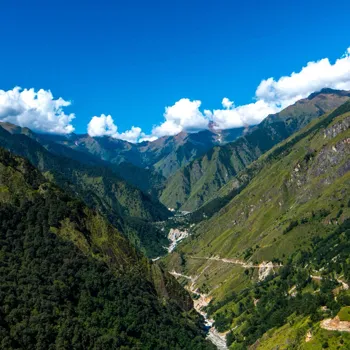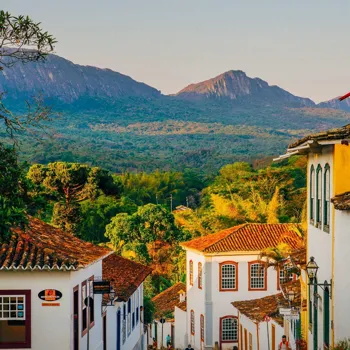Discover 8 Tips for Sustainable Travel & Planet Protection. Transform your trips into eco-friendly adventures!
Namaste, fellow travelers! Are you itching to explore the beautiful corners of India and the world
beyond, but also worried about your impact on the environment? Well, fret not! You can definitely wanderlust without harming our precious planet.

Sustainable travel is all about making conscious choices that minimize your ecological footprint and contribute positively to the places you visit. It's a win-win: You get an enriching experience, and Mother Earth breathes a little easier.
So, let’s dive into these simple yet effective tips to transform your next trip into an eco-friendly adventure.
Pack Light, Travel Right:
The first step towards sustainable travel starts even before you leave your house: packing your bags. Seems simple, right? But trust me, the weight of your luggage has a significant impact. Think about it, the heavier your bag, the more fuel the airplane or car needs to burn to get you there.
This directly contributes to carbon emissions. So, be mindful of what you pack. Do you really need five pairs of shoes for a weekend getaway? Probably not! Choose versatile clothing items that can be mixed and matched. Opt for lightweight travel-sized toiletries to further reduce weight.
Consider rolling your clothes instead of folding them; it saves space and minimizes wrinkles. Bonus tip: Pack a reusable water bottle and shopping bag. This will prevent you from buying plastic bottles and bags at your destination, further reducing waste.
A universal adapter can also prove useful, allowing you to charge your devices without needing multiple adapters, saving space and resources. Remember, every kilogram counts when it comes to fuel consumption. So, pack smart, pack light, and enjoy a lighter carbon footprint on your journey.
Travelling light not only helps the environment, but provides free hands, allowing you to travel safely, and easily.
Choose Eco-Friendly Accommodation:
Where you stay during your travels also plays a crucial role in sustainable tourism. Many hotels and guesthouses are now adopting eco-friendly practices, such as using renewable energy, conserving water, reducing waste, and offering organic or locally sourced food.
Look for accommodations that have certifications like LEED (Leadership in Energy and Environmental Design) or Green Globe, which indicate their commitment to sustainability. Don't hesitate to ask your hotel about their environmental policies. Do they recycle?
Do they have water-saving measures in place? Do they support local communities? Choosing a smaller, locally owned guesthouse or homestay can also be a more sustainable option. These establishments often have a smaller environmental impact and contribute more directly to the local economy.
Plus, you'll likely have a more authentic and immersive experience. If you're feeling adventurous, consider camping or staying in eco-lodges located in natural settings. These options allow you to connect with nature while minimizing your impact on the environment.
Before booking your stay, do a little research to find accommodations that align with your values. Your choice of lodging can make a big difference in supporting sustainable tourism efforts.
Support Local Businesses and Communities:
One of the most rewarding aspects of travel is immersing yourself in the local culture and supporting the people who call that place home. Instead of flocking to chain restaurants and souvenir shops, seek out locally owned businesses and artisans.

Eat at family-run restaurants that serve traditional cuisine made with fresh, local ingredients. Buy handicrafts directly from the artisans who create them.
This not only gives you a more authentic experience, but also ensures that your money stays within the local economy, supporting livelihoods and promoting cultural preservation. When choosing tour operators or guides, opt for those who are locally owned and operated.
They are more likely to have a deep understanding of the area and its environment and will often prioritize sustainable practices. Be mindful of your interactions with local communities.
Dress respectfully, learn a few basic phrases in the local language, and be open to learning about their customs and traditions. Avoid activities that exploit or harm local communities, such as visiting unethical animal attractions or purchasing products made from endangered species.
By supporting local businesses and communities, you're not just a tourist; you're a responsible traveler who contributes to the well-being of the places you visit.
Travel Responsibly:
Sustainable travel is less a complex idea and depends on the simple basics and how we treat the place while traveling. Its dependent on how you treat the residents of the town or country you are visiting and how you respect the culture of the place.

One should not only keep the environment of the place clean but also respect the local beliefs.
Reduce your Plastic Footprint:
Plastic pollution is a major environmental problem, and travelers often contribute to it through single-use plastics like water bottles, straws, and plastic bags. One of the easiest ways to reduce your plastic footprint is to bring your own reusable water bottle and refill it whenever possible.
Carry a reusable shopping bag to avoid using plastic bags at shops and markets. Refuse straws at restaurants and bars, or bring your own reusable straw. Pack reusable containers for snacks and leftovers, and avoid buying individually wrapped food items.
When purchasing toiletries, opt for solid bars of soap and shampoo instead of plastic bottles. If you need to buy packaged goods, choose products with minimal packaging or those made from recycled materials. Dispose of your plastic waste responsibly by recycling whenever possible.
If recycling facilities are not available, pack out your trash and dispose of it properly when you return home. By making conscious choices to reduce your plastic consumption, you can help protect our oceans and reduce the amount of plastic waste that ends up in landfills.
Every small action counts, and collectively, they can make a big difference in reducing plastic pollution.
Respect Wildlife and Their Habitats:
India is blessed with a rich and diverse wildlife and unique natural habitats. If your travel itinerary includes visiting national parks, wildlife sanctuaries, or other natural areas, it's crucial to respect the wildlife and their habitats.

Maintain a safe distance from animals and avoid feeding them. Feeding wildlife can disrupt their natural behaviors and make them dependent on humans. Follow the guidelines provided by park authorities and stay on designated trails.
Avoid making loud noises or engaging in activities that could disturb the animals. Never purchase products made from endangered species or participate in activities that exploit wildlife, such as riding elephants or taking photos with captive animals. Be mindful of your impact on the environment.
Avoid littering, damaging vegetation, or disturbing the natural ecosystem. If you're participating in activities like hiking or camping, pack out all your trash and leave no trace of your presence.
Support conservation efforts by donating to wildlife organizations or volunteering your time to protect endangered species and their habitats.
By respecting wildlife and their habitats, you can help ensure that these natural treasures are preserved for future generations to enjoy and that animals can survive and roam free.
Conserve Water and Energy:
Conserving water and energy is essential for sustainable travel, especially in areas where resources are limited. Be mindful of your water usage in hotels and guesthouses. Take shorter showers, turn off the tap while brushing your teeth, and report any leaks to the management.
Reuse towels and linens whenever possible to reduce the amount of water and energy needed for laundering. Turn off lights, air conditioning, and other electronic devices when you leave your room. Consider opening windows to let in natural light and fresh air.
When exploring cities and towns, opt for public transportation, walking, or cycling instead of renting a car. These modes of transportation are more environmentally friendly and allow you to experience the local culture more intimately. Choose energy-efficient appliances and lighting when possible.
Consider using solar chargers for your electronic devices. By conserving water and energy, you can reduce your environmental impact and help preserve these precious resources for future generations.
Simple actions like turning off lights and taking shorter showers can make a big difference in the long run.
Educate Yourself and Others:
One of the most powerful things you can do to promote sustainable travel is to educate yourself and others about the importance of responsible tourism. Learn about the environmental and social issues facing the destinations you visit.

Read books, articles, and blogs about sustainable travel practices. Talk to locals about their experiences and perspectives. Share your knowledge with others. Encourage your friends and family to travel sustainably. Write about your experiences on social media or in travel blogs.
Support organizations that are working to promote sustainable tourism. By educating yourself and others, you can raise awareness about the importance of protecting our planet and inspire others to make more conscious travel choices. Remember, every traveler has the power to make a positive impact.
By embracing sustainable travel practices, you can explore the world while minimizing your environmental footprint and contributing to the well-being of local communities. So, pack your bags, do your research, and get ready for an unforgettable adventure that's both enriching and eco-friendly!
Shubh yatra (Happy travels)!
AI Generated Content. Glance/InMobi shall have no liability for the content












